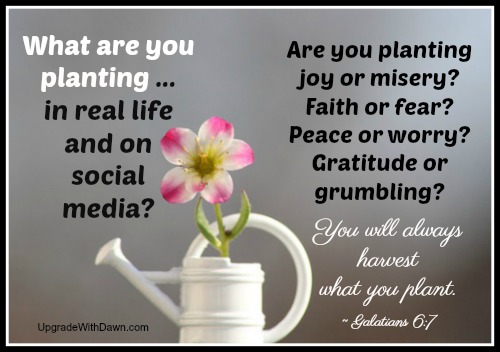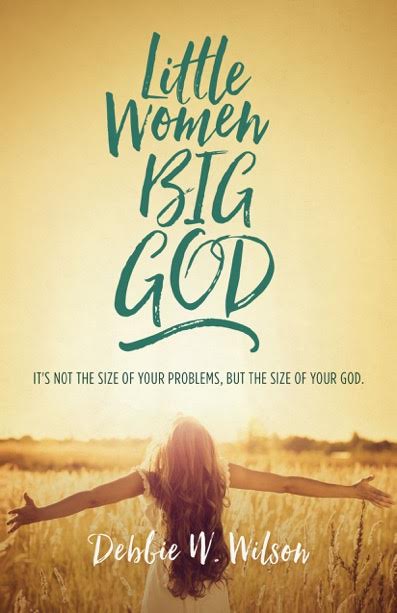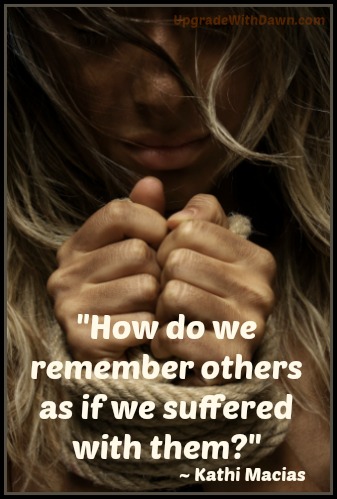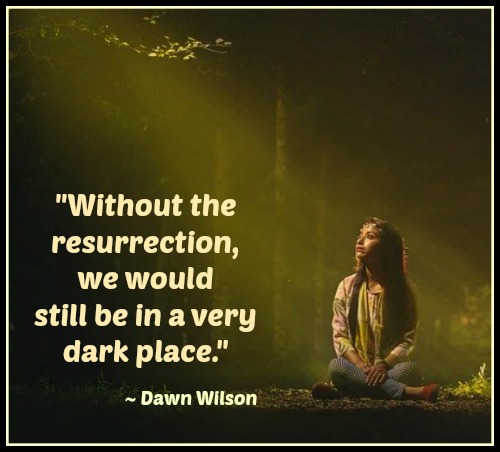Too Soon Old und Too Late Shmart
In this Wisdom UPGRADE, Dawn Wilson encourages the pursuit of wisdom—as early as possible!
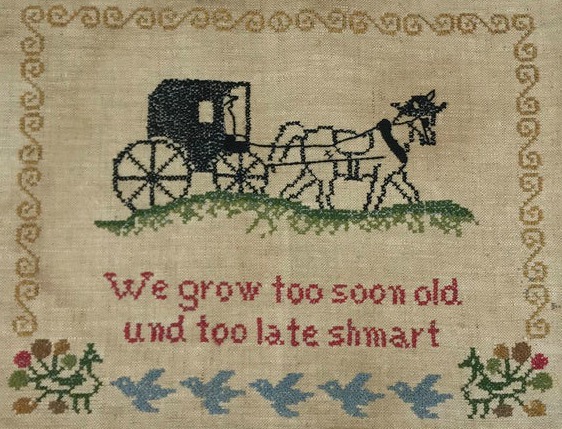
Today is my birthday, and I've been thinking a lot about aging and what it means. As I meditated on God's purposes in my life going forward, a favorite proverb came to mind:
"We grow too soon old und too late shmart."
It is sometimes attributed to Chinese, Japanese, Swedish, Danish, and Jewish sources, but usually, it's considered a "Pennsylvania Dutch" proverb—often seen on their pottery and souvenirs. My German-Dutch grandparents on my dad's side used to talk about being "shmart."
I went to college in Pennsylvania, about two hours north of Lancaster County—sometimes known as "Amish Country." As I understand it, the Pennsylvania Dutch aren't necessarily Amish, but the Amish are Pennsylvania Dutch—but they're not really Dutch. They're German!
The Pennsylvania "Deutsch" (or Pennsylvania Germans) are the descendants of German-speaking immigrants.
I toured Amish Country and had fun learning Pennsylvania Dutch expressions during my two years at college. I remember these two:
"Eat yourself full."
"Outen the lights."
I used to say those two phrases all the time.
But it was their proverbs that captured my thoughts.
- Good marriage counsel for women: "Kissin' wears out—cookin' don't."
- Good marriage counsel for men: "A plump wife and a big barn never did any man any harm."
As I noted, my favorite proverb was "We grow too soon old und too late shmart," because I was at college and focusing on getting smart!
I should have focused on getting wise.
Smart and wise are not the same thing.
My years of schooling taught me many things. I love to read non-fiction, and I remember that as a young girl, I devoured my Grandma Parks' "Lincoln Library" in her attic. This early encyclopedia-type resource encouraged my intellectual curiosity. I felt I couldn't learn enough! And I learned a lot of "facts."
But now, I wish I'd pursued wisdom at that young age.
Not that being smart is bad. In fact, smartness isn't just the facts we learn in school. "Street smarts" is a thing. And people are gifted with all kinds of intelligences.
One source says there are nine types of intelligence.
Wisdom, however, goes beyond intelligence, and the Bible rates it more valuable than "smartness."
- A person can have an extremely high IQ and still be counted a fool.
- A person can be a genius and have no sense.
- Some intellectually-superior people have even been considered evil. (Hitler was thought to be a genius in certain respects.)
- On the other hand, those who might be considered unlearned or slow can be truly wise.
The words "wise" and "wisdom" appear in scripture more than 450 times, so it's something the Lord wants us to consider.
The writer of Proverbs described four animals as "wise" (Proverbs 30:24-28) to illustrate the practical application of wisdom for us.
Biblical wisdom is about understanding how to behave and choose correctly in different circumstances. It's also about knowing how to complete God-given tasks well.
I think my version of that old German proverb might be: "Too soon old and too late WISE!"
There are people who face eternity with very little wisdom, because they failed to avail themselves of the wisdom that comes from God.
But as long as we're alive, we don't have to get stuck there. Our IQ might stay the same until we die, but we can always increase in wisdom—to mature and go beyond the "milk" of the Word to "meat" (Job 32:7; Hebrews 5:12).
Wisdom is so needed today.
- Wisdom is something we need to teach our children.
- Wisdom is so needed in our churches—what we need to hear proclaimed from our pulpits.
- Wisdom is what we need to manifest in our communities to the glory of God.
Here are some biblical facts about Wisdom.
- Wisdom for living begins with knowing God and having reverence and healthy "fear" of Him (Proverbs 9:10). His Word makes even simple people wise (Psalm 19:7b). We need to choose wisdom and learn from it.
- When we choose wisdom, we'll soon discover so many blessings from its presence in our lives (Proverbs 8:12-21; 32-36; 24:14). Wisdom is better than fine gold! (Proverbs 16:16)
- There has been much talk in this year during the Covid-19 pandemic of what is "essential." The Bible says wisdom is essential, because if we fail to find and apply it, we "love death" (Proverbs 8:36).
- One of the qualities of God is wisdom (Psalm 104:24; Proverbs 3:19; Job 12:13; Daniel 2:20; Romans 16:27); and Paul said "all the treasures of wisdom and knowledge" are found in Christ (Colossians 2:2-3).
- We can ask for His wisdom—wisdom from above (James 1:5). He is the giver of wisdom (Proverbs 2:6; Ephesians 1:17).
Today, my birthday, I am recommiting to a scripture the Lord reminded me about last year when I faced a diagnosis of Multiple Myeloma.
In those early days, I didn't know how long I'd live. It was a hard concept to think about. Then I read Psalm 90:12.
So teach us to number our days that we may get a heart of wisdom.
A heart of wisdom. That's what I wanted more than anything. It became a precious thought, replacing my concerns about the length of my life.
Later, the Lord gave me another verse:
Look carefully then how you walk, not as unwise but as wise, making the best use of the time, because the days are evil (Ephesians 5:15-16).
If ever we needed wisdom, it is in these chaotic days. We need more than human intelligence, because God's thoughts and ways are not our thoughts and ways (Isaiah 55:8-9). We desperately need His perfect wisdom and perspective.
Wisdom sets people apart from people who are merely "smart."
Two of Jesus' disciples, Peter and John, were courageous in sharing the Gospel. People around them wondered at them, noting they were "unschooled and ordinary men," but what a difference being with Jesus made in their lives (Acts 4:13).
Spending time with the Lord and His Word will give us courage, but also wisdom. He IS our wisdom from God (1 Corinthians 1:30).
So I'm older today and maybe a little smarter; but my joy is to know wisdom can increase as I allow God's Word to transform my thinking (Romans 12:2) and help me please the Lord.
Can you pray this with me?
Lord, I want a heart of wisdom!
Are you wise? How can your wisdom increase?
Dawn Wilson, founder and President of Heart Choices Today, is a speaker and author,  and the creator the blog, Upgrade with Dawn. She is a contracted researcher/reviewer for women's teacher and revivalist, Nancy DeMoss Wolgemuth, at Revive Our Hearts, a blogger at TrueWoman.com, writes wiki-type posts at Christianity.com, and is a regular columnist at Crosswalk.com. She and her husband Bob live in sunny Southern California, and Dawn has traveled with Him in Pacesetter Global Outreach. They have two grown, married sons, three granddaughters and a rascally maltipoo, Roscoe.
and the creator the blog, Upgrade with Dawn. She is a contracted researcher/reviewer for women's teacher and revivalist, Nancy DeMoss Wolgemuth, at Revive Our Hearts, a blogger at TrueWoman.com, writes wiki-type posts at Christianity.com, and is a regular columnist at Crosswalk.com. She and her husband Bob live in sunny Southern California, and Dawn has traveled with Him in Pacesetter Global Outreach. They have two grown, married sons, three granddaughters and a rascally maltipoo, Roscoe.
Graphic of cross-stitched piece from Unique Treasures PA, on Etsy.
 Post a Comment → Posted on
Post a Comment → Posted on  Thursday, October 1, 2020 at 11:00AM
Thursday, October 1, 2020 at 11:00AM  Dawn Wilson,
Dawn Wilson,  Pennsylvania Dutch,
Pennsylvania Dutch,  Too Soon Old,
Too Soon Old,  Upgrade with Dawn,
Upgrade with Dawn,  Wisdom,
Wisdom,  Wisdom of God,
Wisdom of God,  Wisdom vs. Intelligence,
Wisdom vs. Intelligence,  Wise,
Wise,  Wise vs. Smart Upgrade Your Life
Wise vs. Smart Upgrade Your Life  Biblical Thinking,
Biblical Thinking,  Spiritual Growth,
Spiritual Growth,  Wisdom
Wisdom 




